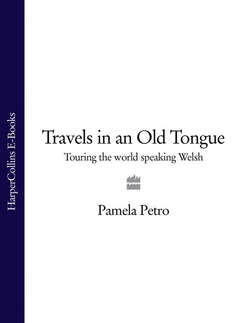Читать книгу Travels in an Old Tongue: Touring the World Speaking Welsh - Pamela Petro - Страница 35
Cymysgu to Mingle
ОглавлениеDutch toilets, I remark to Marguerite, have a flat ledge rather than a bowl filled with water, so you can examine your waste should you so desire. We try to read significance into this but fail.
This morning we wandered around the town centre looking for Delft tiles. Marguerite, who is a world-class fretter, wanted one like Rhiannon and Ed have next to a Welsh lovespoon in their guest room, which reads, ‘Worries are like crumbs in the bed. The more you wriggle, the more they itch,’ but she couldn’t find any by the time we had to get back for the barbecue.
‘Okay,’ I drill her, ‘what’s your mission at this shindig?’
‘Remember what everyone tells me in English so I can tell you what you missed in Welsh.’ I give her a thumbs up.
‘By the way, Pam, isn’t this cheating?’
‘One woman’s cheating is another woman’s book,’ I reply, pointedly.
Unlike the wine and cheese party in Norway, the Delft barbecue is not a lipstick-imperative affair. Phil Jonathan shows up in gym shorts as does Geoff, an Englishman from Amsterdam who’s stuffed a lumberjack shirt into his. Rob and Eryl, both native speakers from Wales, round out the group. I like these people immediately.
Phil and his wife Jana have brought their new baby and their three-year-old daughter Catrin. Perhaps as some unconscious sign of respect for his command of Welsh, I’d assumed Phil was fifty at least; it’s a shock to see he’s my age, maybe younger. He and Catrin immediately flop on the floor to put together a crossword puzzle. Catrin speaks Czech to her mother, who’s from Prague, and Welsh to her father; last year they lived in Houston for a while where she picked up a few words of English, which she’s just beginning to learn in earnest now, in Holland. Of all the people in the room, this little girl with the immense eyes and shiny dark bob makes me the most nervous; she is the first person I’ve encountered on earth with whom I can communicate only in Welsh. It doesn’t go well. I try to help with the crossword puzzle but drive her near desperate with frustration.
‘She says you’re too slow,’ Phil relays sympathetically in Welsh, after she whispers something in his ear.
On my way out to the balcony I notice Rhiannon’s kitchen calendar: yesterday is circled with a note, ‘Welsh woman comes.’ Funny, no one here has asked me why I’m bothering to learn Welsh, something that drives Americans nuts. At home my ‘Welsh thing’ is like an affront to the national cult of utility and pragmatism. Among these people it’s taken for granted, and again, as in Norway, my identity seems more a construct of shared passion and individual practice than something I was merely born with.
On the balcony a barbecuing frenzy has seized Ed, who seems bent on crisping every sausage, steak, chicken wing and veggie burger in Delft. When he runs out of these he grabs a banana, which he roasts in its peel and passes around to whomever wants a taste. Geoff, Rob and Eryl are standing downwind of the grill and by the time I join them have begun to look like baby ducklings, each covered in a fine, fuzzy ash. They’re discussing Welsh in Welsh.
I haltingly tell Rosemary’s story of being yelled at by a woman from Tregaron for speaking high-falutin’ Welsh on the radio. Like Catrin, they get the point before I’m through and move on.
‘Cymraeg Byw, in my opinion,’ adds Phil, who’s joined the group, ‘is whatever Welsh is spoken by living people. If they say leicio instead of hoffwn, or ffeindio if they’ve just found something. What the hell. It’s still Welsh.’
The only word I get for certain is ‘hell’, which he says in English, but that’s his gist. Both hoffwn and leicio mean ‘to like’ (the latter, pronounced ‘lickio’, has always struck me as vaguely obscene); Cymraeg Byw means Living Welsh. It’s a made-up language that was invented in the sixties as a way of uniting all the discordant strands of Welsh: the spoken language of the South, the spoken language of the North (each of these have their own brood of variations), and Literary Welsh (itself an artificial creation). Unfortunately, the only people who spoke Cymraeg Byw were students, and it turned out that no one else could understand them. The simple fact of the matter is that Welsh is like Silly Putty. You can stretch it and twist it and mould it into any number of shapes and it’s still Welsh – which is both a boon and an anxiety for learners. If you’re used to the authoritarian dictatorship of English or French, for example – two of the few systems in the universe in which there exists an absolute right and wrong – then the sloppy democracy of Welsh is unnerving. On the other hand, it’s pretty hard to sin against grammar in any really grievous way.
(This said, there are, of course, no perfect democracies, and a hierarchy does exist among the language’s various incarnations, with Literary or Written Welsh on top, media Welsh next – the formal spoken dialect that Rosemary uses on BBC broadcasts – followed by everyday spoken Welsh, and finally Wenglish, which is spoken Welsh mixed with a liberal sprinkling of English words. Like most dysfunctional families, this group is bound by mutual suspicion and resentment in a fierce love-hate relationship.)
